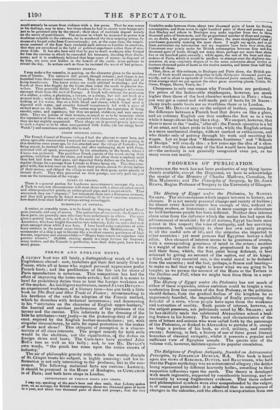The History of Egypt under the Ptolemies, by SAstrisr, SHARPE.
The circumstances which impart interest to history, are obscure. It is not merely personal change and variety of fortune ; for almost every Asiatic empire has enough of this, without at- tracting readers, or historians ; and in mere courage or adventure no half-barbarous people has been deficient. Neither does interest alone arise from the influence which the nation has had upon the advancement of mankind ; for of all nations, Egypt has been most patent in this respect; the voice of antiquity, and her surviving monuments, both combining to show her own early progress in all the useful arts of life, and the stimulus she imparted to other countries : yet most persons find Egyptian history a dull affair. One element of interest seems to be greatness of events, with a corresponding greatness of mind in the actors ; another is a weight of matter in the writer, proportioned to the people anti their fame, which, the first point being deficient, is best achieved by giving an account of the nation, not of its kings; a third, and very essential one, is the useful moral to be declined from the narrative ; and the last, perhaps, is fitness and bearing— to make us feel that we ought to know what we are going to be taught; as we peruse the account of the Huns or the Tartars in the Decline and Full, when we might turn front them in a sepa- rate volume.
The History of Egypt under the Ptolemies has not much of either of these requisites, unless ambition could be taught a wise moderation from the caution of the first Ptolemy, or the politician should deduce, from the gradual decline of the kingdom he so sagaciously founded, the impossibility of finally preventing the downfal of a state, whose people have upon them the weakness and corruption of senility. Such points of interest, however, as the subject possesses, are judiciously noted by Mr. SHARPS; and he has skilfully made the celebrated Alexandrian school a lead- ing feature in his history. The works and characteristics of the men of letters and science who were called forth by the patronage of the Ptolemies, or flocked to Alexandria to partake of it, occupy as large a portion of his book, as civil, military, and courtly events ; forming, in fact, a history of one of three great literary branches of classical antiquity, whilst it presents a popular and sufficient view of Egyptian annals. The quarto size of the volume will, however, militate against its popular circulation.


























 Previous page
Previous page